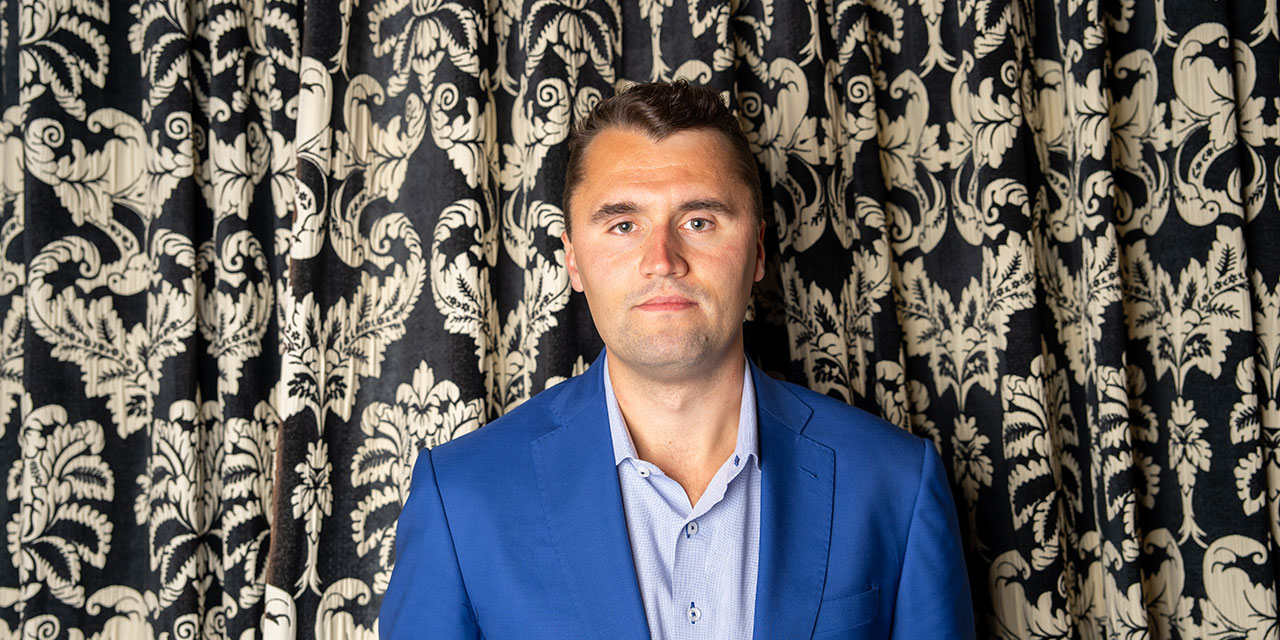
I first heard Charlie Kirk speak on a bitterly cold February night in 2018 at the University of Michigan. I went to the event out of curiosity, nudged by friends active in campus conservative life. At the time, I saw myself as a different kind of conservative—graduating early, serving as a campus ambassador for a proper, center-right Washington think tank that prized bipartisan respectability. Kirk, just a few years older than I, was the bomb-thrower who never went to college. I was skeptical of where the Right might be headed; Charlie was steering the ship.
That night, Charlie changed my mind—just as he did for thousands of other students over the years whose politics were far more distant from his than mine. He wasn’t the caricature I expected. He was fearless, sharp, and magnetic, dismantling opponents with humor, composure, and an encyclopedic command of facts. I walked in thinking I was there to observe a less-evolved stream of the conservative movement. I left believing that the opposite was true: Kirk was on the cutting edge of conservative evolution, fully prepared to win hearts and minds in a new political era—and I, like many others in my generation, was eager to join the movement he was building.
Kirk was murdered Wednesday at Utah Valley University, shot in the neck before a massive crowd at an outdoor “Prove Me Wrong” debate. It was one of countless events where he invited students of every ideology to challenge him—and engaged them all in good faith.
The circumstances sting. Even after the attempt on Donald Trump’s life in Butler, Pennsylvania last summer, we were not in such uncharted territory. Presidents have been shot, and shot at, before. But to assassinate a young father for debating college students, for organizing young Americans to vote for a party representing half the country—that’s new ground for America. This wasn’t an attack on an extremist or a fringe agitator, but on a highly visible, mainstream, optimistic figure. It takes a particular kind of evil to target a man like that.
Charlie Kirk wasn’t some run-of-the-mill provocateur. He was a serious thinker, an entrepreneurial builder, and a political winner. At 31, he had done what movement conservatives hadn’t accomplished since William F. Buckley: make conservatism feel young.
Kirk built Turning Point USA into a sprawling network of chapters, conferences, training programs, and media platforms. In 2018, Donald Trump Jr. said, “If it weren’t for Charlie Kirk, my dad would not be president of the United States today.” By 2024, Trump’s campaign and the GOP effectively outsourced their ground game to Kirk’s operation, which poured tens of millions into mobilization and helped Republicans achieve near-parity among young voters in swing states.
He was also a generational talent with what felt like no ceiling. Prominent donors and influential politicos whispered that he could be president someday. They weren’t being hyperbolic. Kirk combined charisma, media fluency, policy knowledge, and organizing chops in a way few activists ever have.
In explicit terms, Kirk had warned that this was coming. In April, he wrote about “assassination culture,” predicting that a political class addicted to rage and spectacle would escalate into violence. Just weeks ago, on CNBC, he argued that empowering radicals like Zohran Mamdani was fueling Luigism, an online-driven ideology of envy and class hatred that may lead to more left-wing nihilists carrying out and reveling in political violence. And unfortunately, countless such ghouls are now proving him right, celebrating his death in dark corners of social media with glee and mockery.
Kirk also understood the stakes of the ideological battle on the right: a choice between a politics of ownership and aspiration, on the one hand, or a politics defined by grievance and resentment, on the other. He fought this fight—sounding alarms about conspiratorial anti-Semitism pulling young men down online rabbit holes and urging them toward self-improvement instead of scapegoating. He wanted to build a movement rooted in purpose, not bitterness.
His death is an immeasurable tragedy for his wife, Erika, their two young children, and his parents. I am praying for them.
It is also a tragedy for the country. He built a politics that wasn’t just about “owning the libs” online—though he did plenty of that—but about showing up: on campuses, in swing states, in places where his message was met with hostility. His death is devastating not only because he was so young and had so much to live for but because he proved that no audience is unwinnable when met with courage and a compelling message.
Kirk represented a conservative movement that could inspire young people. For years, conservatives had failed to capture cultural energy. Kirk did it almost effortlessly. He gave the right a sense of swagger—his organization was something closer to a counterculture than a think tank or civic club.
He wasn’t the archetypal bow-tied campus ideologue but someone who felt like he belonged at a frat party, a peer rather than a scold. That made his presence and intellect disarming. It also made his message go farther. He was polarizing because he mattered.
It is now widely accepted that Gen Z is far from a monolithic left-wing bloc. Data show a cohort breaking with that image, trending more conservative than previous generations at the same age. But that cohort is divided between those who want to build and others drawn to destruction. Kirk spent his career recruiting builders and trying to rescue the rest.
With Kirk’s assassination, we don’t just lose a pundit. We risk losing the generation of conservatives he helped create. Imitators abound, but few match his authenticity and conviction.
Charlie Kirk died debating, giving opponents a platform to challenge him. He represented the best of America. And America is better for having had him.
Photo by Nordin Catic/Getty Images for The Cambridge Union















